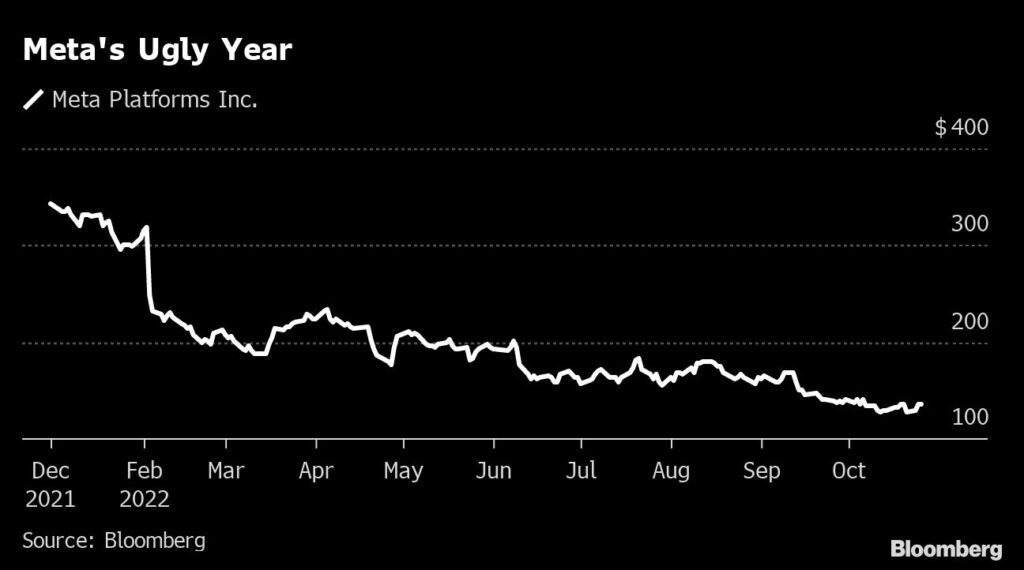

The recent plunge in shares of Meta Platforms Inc. is causing fresh pain to leading funds held in retirement savings plans such as 401(k) plans.
Some of the most popular retirement funds have large holdings of big-tech stocks like Meta, Amazon.com Inc. and Apple Inc. That boosted their performance in 2021 as shares surged to record highs, but turned into a drag this year as the broader stock slump hit high-flying technology companies particularly hard.
No big-tech stock has been hit harder than Meta (formerly known as Facebook), which has tumbled more than 70% this year, including a 25% slump last Thursday after the company gave a disappointing revenue outlook and reported surging costs related to its investments in virtual reality.
Many of the most popular actively managed mutual funds in 401(k)s already had large losses from their big-tech holdings this year. Meta’s drop last Thursday, alongside a downbeat assessment of holiday sales by Amazon.com Inc. that sent the online retail giant’s shares down nearly 10% last Friday, deepened the decline.
Fidelity Contrafund (FCNTX), T. Rowe Price Blue Chip Growth Fund (TRBCX), and Growth Fund of America (AGTHX) were down 29%, 37% and 30%, respectively, for the year as of last Thursday’s close; the S&P 500 had fallen 20%.

While the Meta stakes in the three growth funds declined in recent quarters — some due to trimmed positions, in other cases due to the stock’s price drop — it remained among their top 10 holdings as of Sept. 30.
At the $90.8 billion Fidelity Contrafund, the stake in Meta was 6.2% at the end of the third quarter, down from 9.7% on Jan. 31, according to Morningstar data. In a Sept. 30 shareholder note, the fund remained bullish on Meta.
“We see it as a leading tech company that generates healthy operating margins and free cash flow,” the note explained. “We held steady the fund's commitment to Meta because its valuation is attractive relative to its expected rebound in free cash flow next year. It was our No. 4 holding at quarter end and our second-largest overweight.”
The $56.1 billion T. Rowe Price Blue Chip Growth Fund, meanwhile, held 2.8% in the battered tech company as of Sept. 30, down from 6.7% at the end of January. The fund sold some of its Meta stake earlier this year.
At the $199.2 billion Growth Fund of America, Meta was 2.3% of assets as of Sept. 30, making it the fund’s sixth-largest stock position. That’s down from 4% at the end of 2021.
The top 10 stocks in Growth Fund of America’s portfolio represent far less of the fund’s overall assets than at T. Rowe Price Blue Chip Growth Fund and Fidelity Contrafund. Growth Fund of America has 38.5% of the fund in its top 10 stocks, compared with 63% and 49% for the T. Rowe Price and Fidelity funds, respectively.

Chasing productivity is one thing, but when you're cutting corners, missing details, and making mistakes, it's time to take a step back.

It is not clear how many employees will be affected, but none of the private partnership’s 20,000 financial advisors will see their jobs at risk.

The historic summer sitting saw a roughly two-thirds pass rate, with most CFP hopefuls falling in the under-40 age group.

"The greed and deception of this Ponzi scheme has resulted in the same way they have throughout history," said Daniel Brubaker, U.S. Postal Inspection Service inspector in charge.

Elsewhere, an advisor formerly with a Commonwealth affiliate firm is launching her own independent practice with an Osaic OSJ.
Stan Gregor, Chairman & CEO of Summit Financial Holdings, explores how RIAs can meet growing demand for family office-style services among mass affluent clients through tax-first planning, technology, and collaboration—positioning firms for long-term success
Chris Vizzi, Co-Founder & Partner of South Coast Investment Advisors, LLC, shares how 2025 estate tax changes—$13.99M per person—offer more than tax savings. Learn how to pass on purpose, values, and vision to unite generations and give wealth lasting meaning
